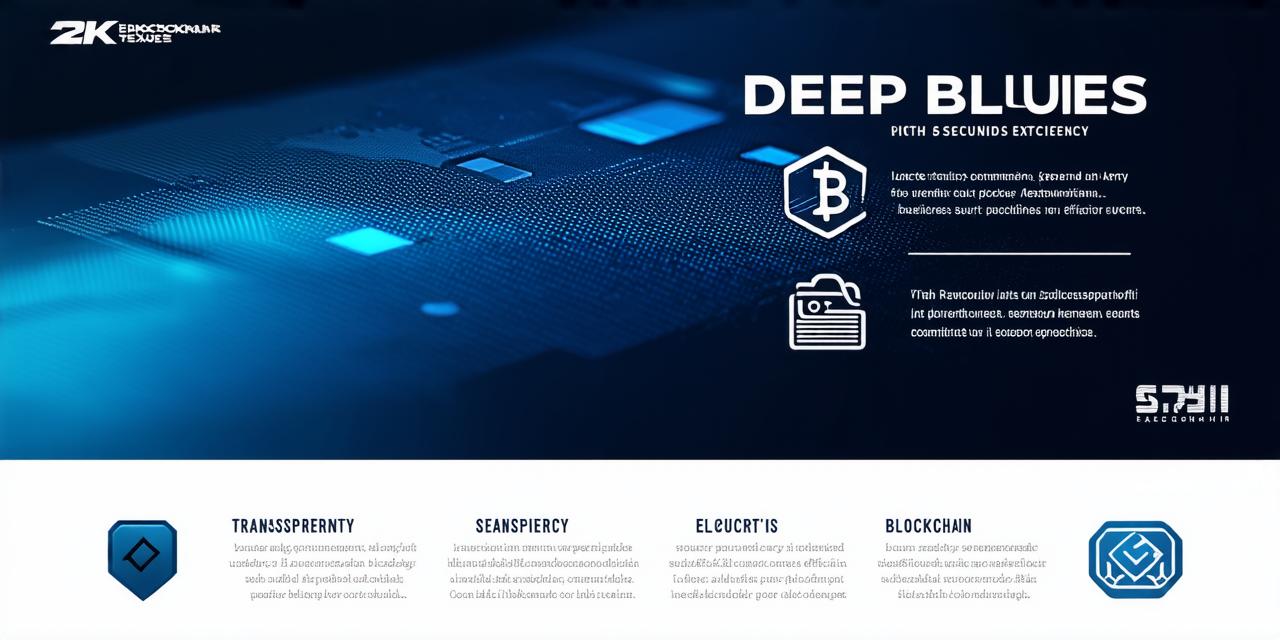What are some potential benefits of blockchain for businesses
Introduction
Blockchain technology is rapidly gaining traction as a solution to various business problems. This decentralized, secure, and transparent ledger has the potential to revolutionize industries ranging from finance to supply chain management.
In this article, we will explore some of the benefits of blockchain for businesses and how it can help organizations unlock their full potential.
Improved Transparency and Security
Blockchain technology provides improved transparency and security for businesses. It creates a decentralized network where all information is stored on a distributed ledger that is transparent, secure, and immutable. This eliminates the need for intermediaries and allows for direct transactions between parties, reducing costs and increasing efficiency.
One example of the use of blockchain technology for improved transparency and security is supply chain management. Blockchain can be used to track products from their point of origin to the end consumer. By creating a transparent ledger, companies can ensure that all stakeholders have access to the same information, reducing fraud and increasing trust in the supply chain.
Another example is banking and finance, where blockchain technology can eliminate the need for intermediaries such as banks, reducing transaction times and costs. It also provides greater security, as all transactions are recorded on a transparent ledger that cannot be altered or deleted.
Improved Efficiency and Cost Reduction
Blockchain technology can help businesses improve efficiency and reduce costs through smart contracts. Smart contracts are self-executing contracts with the terms of the agreement between buyer and seller being directly written into lines of code. They allow for automation of contract execution, eliminating intermediaries and reducing transaction times and costs.
For example, a real estate company could use smart contracts to streamline the home buying process. The contract would be automatically executed when certain conditions are met, such as payment received and property inspected. This eliminates the need for intermediaries such as lawyers and reduces transaction times.
Improved Data Management and Analysis
Blockchain technology can improve data management and analysis for businesses. By storing information on a distributed ledger, it ensures that all parties have access to the same information, reducing errors and increasing accuracy. Additionally, blockchain allows for easy data sharing and analysis, enabling businesses to make more informed decisions.
For example, a healthcare company could use blockchain technology to securely store and share patient data. This would allow doctors to access the latest medical records, reducing the risk of medical errors and improving patient care. It would also enable researchers to easily analyze patient data for medical research purposes.
Improved Traceability and Accountability
Blockchain technology can improve traceability and accountability for businesses. By creating a transparent ledger that records all transactions, it ensures that all parties have access to the same information and reduces fraud. Additionally, blockchain allows for easy tracking of products or assets, enabling businesses to quickly identify and address any issues.
For example, a pharmaceutical company could use blockchain technology to track the distribution of medication. By creating a transparent ledger that records all transactions, it ensures that medication is delivered to authorized parties and reduces the risk of counterfeit drugs entering the supply chain. It also allows for easy tracking of medication, enabling businesses to quickly identify any issues with distribution.
Case Studies
IBM Food Trust
IBM Food Trust is a blockchain-based platform that enables food companies to track their products from farm to store. By creating a transparent ledger, it allows all parties to have access to the same information, reducing fraud and improving traceability. This has resulted in increased efficiency and reduced costs for businesses.
Walmart’s Blockchain Pilot
Walmart’s blockchain pilot is a supply chain management system that uses blockchain technology to track products from their point of origin to the end consumer. By creating a transparent ledger, it allows all stakeholders to have access to the same information, reducing fraud and increasing trust in the supply chain. This has resulted in increased efficiency and reduced costs for Walmart.
Maersk’s TradeLens
Maersk’s TradeLens is a blockchain-based platform that enables companies to track their products throughout the entire shipping process. By creating a transparent ledger, it allows all parties to have access to the same information, reducing fraud and improving traceability. This has resulted in increased efficiency and reduced costs for businesses.
Expert Opinions
FAQs
Q: How does blockchain technology improve transparency?
Blockchain technology creates a decentralized network where all information is stored on a distributed ledger that is transparent, secure, and immutable. This eliminates the need for intermediaries and allows for direct transactions between parties, reducing costs and increasing efficiency.
Q: How does blockchain technology improve security?
Blockchain technology provides greater security, as all transactions are recorded on a transparent ledger that cannot be altered or deleted. This eliminates the risk of fraud and increases trust in the system.

Q: What is a smart contract?
A smart contract is a self-executing contract with the terms of the agreement between buyer and seller being directly written into lines of code. They allow for automation of contract execution, eliminating intermediaries and reducing transaction times and costs.
Summary
Blockchain technology has the potential to revolutionize industries and improve efficiency, cost reduction, transparency, and traceability for businesses. By utilizing blockchain technology, businesses can unlock their full potential and drive growth through improved operations, increased trust, and reduced costs. As blockchain technology continues to evolve, it will likely become an essential tool for businesses looking to stay competitive in today’s rapidly changing landscape.



